|
On-Campus Research Opportunities
Rice's chemistry department strongly supports undergraduate research. All chemistry majors
are required to take at least 3 credit hours of research (CHEM 491), but any motivated
student, any year, any major is always welcome. And you won't just be washing glassware. Professors realize the value of
undergraduates and allow them to participate in actual, ground-breaking research. An
incredible number of papers have been co-authored (and even authored) by Rice undergraduates, not to mention the posters and
presentations given at local or national meetings. Whether you just finished struggling
through freshman chemistry or you're a senior who has worked at Harvard for the past 3
summers, there are professors who are willing to work with you.
You can either get paid or get credit for research (not both). Most people get credit
during the school year and get paid over the summer. The major drawback to research is
that it can be very time consuming, so we don't recommend trying it during really hard
semesters.
Take a look at the descriptions, but don't stop here. Email or stop by the professors'
offices to talk about their research in more detail and see if they have space available.
The professors are approachable and you will learn a lot by talking to them.
Brought
to you by Owlchemy (Student Affiliates of the American Chemical Society)
Please send comments to owlchemy@rice.edu
All
pictures of the professors on these research pages are courtesy of
dacnet.rice.edu.
|
|
|
|
|
Research
Projects: Chemistry
and Materials Science of the Group III (13) metals
1.
Aluminum-oxide nano-particles as new materials and precursors for
ceramics with controlled porosity.
2. Group 12/13 catalysts for H/D exchange and olefin oligomerization.
3. The chemistry of borate and aluminates in the oil industry.
4. Alumoxane catalysts.
Your Job in the Lab: The
students are given their own project to work on.
Recommended experience: The
student should have already taken undergraduate chemistry labs (i.e.
CHEM 121-122 (general chemistry labs), 213-214 (the organic chemistry
labs), or the module system).
Positions Open: There is currently
1 position for the summer and 1 position for the fall of 2000.
Students may continue working through the year if they come in during
the summer. |
|
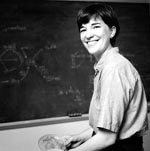 |
|
|
What you
would do: This project will
be available starting in January to analyze a plant mutant that has
increased sensitivity to the phytohormone auxin. The project
involves phenotypic characterization and recombination mapping using PCR-based
molecular markers. This would be appropriate for a BIOS 310 student.
Suggested experience:
I am looking for someone who is interested in genetics, and who is
interested in the possibility of continuing the project through the summer
(and possibly next year as well). A sophomore would be my first
choice; juniors and freshmen are also possibilities.
|
|
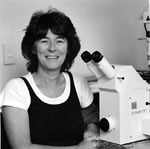 |
|
|
|
What
would you do: This lab will studying
Gravitoxic Drosophila (fruit fly) mutants.
Positions Open: I
need 4-5 undergrads next semester. If you are interested email her
ASAP at kate@bioc.rice.edu.
|
|
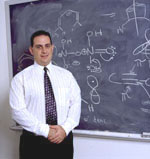 |
|
|
| This group
does "traditional organic synthesis." They don't have a homepage yet, but they
should soon.
Synthetic organic chemistry and methodology
development. Synthesis of bioactive natural products. Synthesis of
optically active biaryls for use in catalytic enantioselective synthesis.
|
|
|
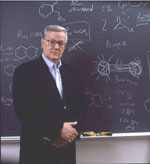
|
|
|
| Hydrocarbon
Chemistry- theoretically interesting molecules.
Chemistry of small ring systems; reactive
intermediates; synthetic methods; organo-transition metal chemistry,
chemistry of free metal atoms; fullerene chemistry.
|
|
|
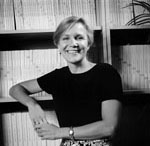
|
|
|
|
What
would you do:Molecular genetic techniques are used to elucidate the functions of genes involved in plant cell signaling and
wall genesis. We are interested in how these genes are used to help plants
adapt to environmental stress.
Organization:
Most
undergraduate students have relatively independent research projects or
may work closely with a graduate student or postdoc. Some students
who have little or no experience may start by helping to prepare reagents,
pour plates, do DNA preparations, etc.
Positions Open: I
usually have at least two positions for undergraduate researchers in my
lab.
|
|
|

|
|
|
What you
would do:This group is studying electron transfer by
detecting the positive and negative ion formed when two neutral species collide. You
could make measurements to determine the energy of the collision . Alternatively, you
could write computer code for developing new coincidence methods for making measurements
of the initial and final energy.
What you would learn: You would
be exposed to a wide variety of experimental skills, such as design and construction of
mechanical and/or electronic apparatus, computer interfacing, and data analysis.
There might be opportunities to gain experience in Fortran and/or Matlab.
Organization: The professor works
in the lab and is available for discussion, but students are allowed to work by
themselves.
Suggested Experience: Experience
in mechanical and/or electrical work would be useful for an experimentalist.
Interest or experience in computer programming is a necessity for someone writing
code. Anyone who is interested will be considered, but should probably have
completed freshman-level courses. |
|
|
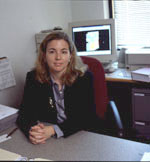
|
|
|
|
Description:
We both make
(synthesis) and study (physical chemistry) nanoscale materials. Some of
the nanosized systems we look at are interesting for their potential
technological relevance: artificial opals, for example, are great optics
which allow for precise control over the propagation of light. We
have a large effort in making opals, and in using them as scaffolds to
construct new porous materials. Other projects are motivated by
fundamental questions which seek to elucidate the difference between
"molecules" and "solids". We can address this
issue because we can make molecules of increasingly larger size- and
study how molecular properties evolve into bulk solid state behavior.
Our web page at nanonet.rice.edu has a current list of all of these
diverse research areas and their current status.
Your Job in the Lab:
It will
depend on the student's interests. We have found that our group,
as well as the students who
work with us, benefit the most when undergraduate project's are
defined by what they need from the experience rather than what work we
need done. Sometimes, undergraduates are certain they want to go to
graduate school in chemistry. In this case, their undergraduate research is critical to their future
career so we encourage them to start work early with us and steer them
onto projects that are producing publications in the near-term.
Often undergraduate students interested in graduate school are not
certain about the specific area (inorganic, organic, physical, theory)
they want to specialize in. Given the diversity of work in our
group, we can provide these "undecided" people with a broad
experience, in both synthesis and physical measurement, so they can evaluate what area they like the best. Finally, in
some cases students have non-research career plans and only work in our
group briefly. In this instance, we find that it is best to have them
work as part of a larger team (more than 3 student) project so they
learn about the many different aspects of a research environment in
their short time.
Recommended experience:
If a
student is interested in a brief, semester-long, project we prefer
seniors who have had several advanced labs, as well as physical
chemistry. However, if a student wants to start early and stay
working in our group for a while, we are willing to train them in the
laboratory and instrumentation skills necessary for our projects.
Positions Open:
We typically
have 3-4 summer and semester undergraduate research positions. This year
the potential projects include an instrumental project which would be
learning scanning electron microscopy to look at nanoscale materials, a
biological materials project which is a collaborative effort with
biochemistry, and an experimental/theory project on opals |
|
|
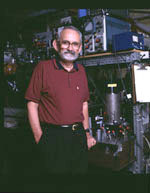
|
|
|
Description: We investigate the gas phase infrared spectra and chemical
kinetics of small highly reactive free radical species. Mostly we
are interested in radicals which may play some role in combustion. We
produce these radicals by flash photolysis of a suitable precursor and
probe their infrared absorption spectra with single frequency, cw,
tunable IR lasers. We are also working on observing larger free radicals
by IR at the very low temperatures achieved by supersonic expansion. We
also are developing infrared laser IR atmospheric monitors.
Your Job in the Lab: Organic synthesis of precursor compounds that
are photolyzed to produce free radicals. Once you make the compound, you can see what
happens when it is photolyzed, working with other members of the research group.
Or, you can do computer programming. concerned with improving our
data collection and data analysis software.
Recommended Experience: For synthesis
the basic introductory modules 351 and 352 although the advanced module
in synthetic chemistry 372 would be desirable. For programming a
knowledge of Quickbasic for the PC is needed and some knowledge of PC
assembly language is desirable.
Positions Open: Probably 1 perhaps 2 positions will be available in the
summer and fall of 2000. |
|
|
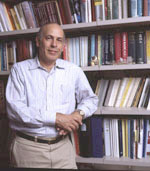
|
|
|
What you
would do: Short synthesis of an unnatural product,
something that is needed for mechanism studies. Alternately, you might do first
order kinetics on a compound that you or somebody else has made.
What you would learn:The
techniques used for kinetics are usually UV, NMR, or gas evolution. You can learn a
huge amount amount about laboratory technique, spectral interpretation, and operation of
analytical instruments. Publication is possible for students who work more than one
semester.
Organization: Supervised by a
postdoc, with periodic discussions with professor when you wish.
Suggested Experience: Elementary
organic chemistry is a must. Advanced orgo and Chem 352 are helpful. |
|
|

|
|
|
What
you would do: This will be for a paid lab assistant to do dishes, autoclaving and help with
experiments.
Positions Open: I
will probably have one position available next semester. A work-study
student would be preferred.
Environment: This
lab will require about 10-15 hours/week.
|
|
|
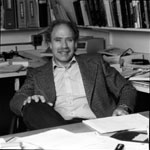
|
|
|
What
you would do: In this lab, you would
study neurotransmitter biding to neural receptors.
Positions Open: I
may have a position this spring.
Environment: This
lab will require about 12 hours/week.
|
|
|

|
|
|
| We study
molecules and reactions involved in combustion processes such as those occuring in an
acetylene flame. In particular, we observe highly reactive, short-lived species called
"radicals" that are difficult to track using conventional methods. With our
equipment, we can create radicals through photolysis (the breaking up of a molecule using
light) of stable molecules. We can then monitor the infrared spectra of the radical in
order to determine information about its structure, or we can monitor its reaction over
time with itself or other molecules in order to determine its rate of reaction.
|
|
|
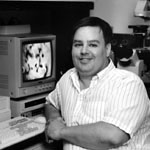
|
|
|
Positions Open:
I always have (unpaid) research
projects for undergrads.
Note: Typically
students contact me, we talk about what they are interested in doing and
how much time they have for the project, and we find something.
|
|
|
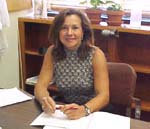
|
|
|
Description:
The Halas Nanoengineering Group explores the
synthesis, properties, and "technology"
of nanoscale particles. In the past few years, we
have developed a new type of nanoparticle called a
Nanoshell, which is a spherical, layered nanoscale
structure consisting of a dielectric core (silica)
coated by a thin metal shell (gold or silver, for
example). By adjusting the relative diameter of
the core and thickness of the shell we can tune
the optical absorption of Nanoshells over an
enormous wavelength range, from the visible to the
infrared: this far-ranging optical tunability is
unique to Nanoshells. We have also developed a new
method of synthesizing silica nanoparticles doped
with lanthanide ions, which have enormous
potential for use in optical devices, and we have
recently developed new methods for synthesizing
novel anisotropic nanoparticles. The Halas group
webpage is found at http://www.ece.rice.edu/~halas.
Atmosphere:
Our group is the most multidisiplinary research
group on campus with members and alumni from
Physics, Applied Physics, Physical, Inorganic, and
Organic Chemistry, Electrical Engineering,
Chemical Engineering, Materials Science, and
Bioengineering. The group atmosphere is very
friendly, cooperative, and motivated. There is a
strong emphasis on individual professional
development, where all participants develop a
broad range of skills, learn, make mistakes, and
celebrate achievements. Each group member
(including undergraduates) works on his or her own
separate research project, but communication and
collaboration between group members frequently
occurs. Undergraduates would be guided by a
graduate student or students, but would most
likely be pursuing their own project goals.
Undergraduate
Opportunities:
Currently we have projects ranging from the basic
physics and chemistry of our nanostructures to the
development of various technological applications
utilizing our nanostructures. We have projects
open to undergraduates ranging from synthetic
chemistry to physics to computer science. Among
these are the synthesis of nanoshells of different
metals, different cores, and with dopant species
inside, assembly of nanostructure aggregates,
studies of the Surface Enhanced Raman Scattering
effects from nanoshells, an NMR project to study
the relaxation of water molecules around various
types of nanoparticles, or a theory project which
would examine the changes in electromagnetic
responses of anisotropic nanoparticles and
self-assembled nanoparticle aggregates. There is
also the opportunity to work on polymer chemistry
projects investigating the chemical modification
of hydrogel/nanoshell composites. (These composite
materials are useful for photothermally-triggered
drug delivery and were developed through our
long-term collaboration with Prof. Jennifer West's
group in Bioengineering.) You will have the
opportunity to learn a variety of instrumental
techniques such as scanning electron microscopy,
transmission electron microscopy, atomic force
microscopy, as well as a broad range of
spectroscopies (UV-vis, IR, Raman).
Recommended
Experience: We
can accept seniors looking for a research project,
as well as well prepared and highly motivated
sophomores and juniors who would want to
participate in our research group as a long-term
research experience.
Positions Open: We can accommodate 2-3
undergraduates. |
|
|
|
|
|
| CVD Diamond Growth
Mechanisms, Reactions of Metal Atoms and Small Clusters, Measurements of the Physical and
Thermodynamic Properties of Liquid Metals and Alloys. |
|
|
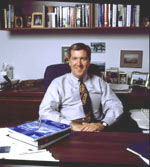
|
|
|
What you
would do: Theoretical research involving computer
modelling of protien folding or energy transfer.
What you would learn:You get to
work on something that's never been done before, and gain a good understanding of
your project. Dr. Hutchinson and the post-doc Sue are enjoyable to work for.
Environment:The lab is casual
and friendly, but there is little interaction between group membrs, since everyone works
alone at a computer.You set your own hours (typically 6-8/wk) and can log in and work from
the colleges, if you want. The only drawback in this lab is that sitting at a computer too
long can (literally) be a pain in the neck.
Suggested experience: Familiarity
with MATLAB and UNIX (MATH211 and NSCI 230 are good preparation). Differential equations
and occasionally vector are used, but mostly the math involves algebra. |
|
|
|
|
|
What you
would do: We are using laser light to study the
fundamental forces that bind molecules together. Photons scatter inelastically from
the target species and transfer some of their energy, causing it to vibrate. A new
direction is a project to determine the binding forces of molecules adherent to the
surfaces of small particles. You would work on the construction of the cells that
will contain the sample and the optical system that will collect and analyze the scattered
light. Subequently, you will participate in the computer controlled data collection
using high-sensitivity optical detectors. Test systems presently under consideration
are ozone adsorbed onto silica particles and also halogens or amines adsorbed on graphitic
carbon and C60. This will be extended to other nanoparticles, metallic or
semiconductor, as results dictate.
What you would learn: This is an
excellent opportunity to add new lab skills. Specific skills are generally learned
"on the job" and include vacuum systems, gas handling, optical alignment,
assembling electronic circuits, and CAD design/drawing.
Organization: The undergraduate
is given one or more projects which are sub-components of the larger research
project. Depending on the level of previous experience, the size of the first
project is tailored accordingly. The work is guided by a full-time experimental
research scientist. The student will carry overall responsibility to make the
project work, but will have all the assistance necessary to bring it to fruition.
Suggested experience: Prior
laboratory work is beneficial.
Note: This is primarily an
opportunity for hands-on experimental research. Perhaps due to the ubiquitous
presence of computers, the basic experience with, e.g., mechanical and electrical devices
is diminishing; yet the challenges of cutting edge scientific research requires
construction of ever more sophisticated and delicate instruments. The learning curve
for acquisition of practical skills is consequently becoming steeper for successful
experimental research in graduate school. A proven track record for an undergraduate
in a research lab stands out on an application. Reports from those in our group who
have gone to graduate school indicate that the undergraduate research experience has been
quite beneficial in launching their graduate research program. |
|
|
|
|
|
| More
information will soon follow. Dr. Kolomeisky
is currently looking for one or two undergraduates
to work for him. See his group webpage for
more information. |
|
|
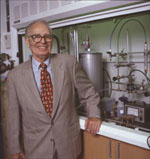
|
|
|
| Diamond Films,
Levitation Studies, Environmental Chemistry, Matrix-Isolation Studies, Fluorine Chemistry
|
|
|
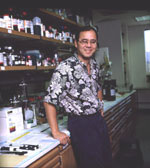
|
|
|
What you
would do: This lab is composed of people from many
different backgrounds, and does a
very broad range of research (ranging from evolution studies to
yeast genetics to bioengineering), and it is consequently difficult to say anything
specific about what sort of projects new people might pursue in this lab. Most
undergraduate students work on cloning new biosynthetic genes or generating mutants in
known genes to make enzymes with new functions.
Organization: Students initially
work closely with a graduate student, and then become independent
as they become more experienced.
Suggested experience: I
would rather take students as freshmen or sophomores, and have them
work with me for several years than take more advanced students and
have them work for a semester or two. I do not expect incoming students to have any
specific courses or lab experience, but they must be motivated and organized so as to come
up to speed quickly.
Note: This lab is an appropriate
place for people interested in graduate school in the biological end of chemistry or the
chemical end of biology. We are not doing anything directly medical, and premedical students would probably be better served by finding research
opportunities in the medical area. |
|
|
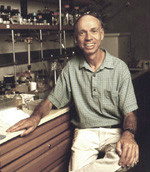 |
|
|
| This group is
concerned with the biosynthesis of natural products and the mechanisms of enzymatic
reactions. The current trend in these studies places an emphasis on the characterization
of interesting biosynthetic reactions at the enzymatic level and on the application of
molecular biology to the study of secondary metabolism.
|
|
|
 |
|
|
What
you would do:
As for projects, they
change all the time and I try to match a project to a student's interests.
Positions Open: I
will usually take up to 2 undergraduates at a time, but no more.
Organization: I
routinely have undergraduates doing research in my laboratory. There
is even a summer program in computational biology. It seems best
when students spend two semesters on a project as it takes a while to get
started. You may also know that the biochemistry and Cell Biology
department encourages senior research for students with a B average or
better. I have had many of these students.
|
|
|
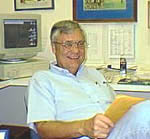
|
|
|
| An area of current
interest is a study of the biogenic emission of radiatively active atmospheric trace
gases, particularly methane and nitrous oxide.
|
|
|
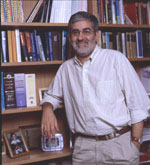
|
|
|
What you
would do: Carry out quantum chemical calculations on
molecular systems and/or write computer programs in FORTRAN or C for specific
methodological developments in quantum chemistry.
What you would learn:
Students
are expected to write papers for publication in peer-reviewed journals. You will also have
a chance to experience
how this lab does theoretical chemistry (challengeing and fun). Most
students in this group have been admitted to their first choice graduate school. Three
have been top author on papers in top journals like Science and Nature.
Organization: Undergrads are
watched loosely, but the professor's office is always open and he's usually there 8 to 6.
Suggested experience: It's best
to have some Physical Chemistry and computer experience, although certain projects (like
fullerenes and nanotubes) do not require it. |
|
|
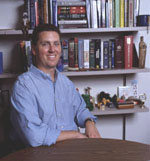
|
|
|
What you
would do: Research efforts in this laboratory are divided
into two project areas: Probing molecular interactions during
DNA strand exchange mediated by the RecA protein of Escherichia coli and design of
modular proteins that mimic the properties of natural enzymes.
What you would learn: Strong
emphasis is placed on understanding what you are doing and why it is important.
Environment: Laid back,
and easy. Not too hard-core. The professor is motivating, although he is often
difficult to find. The other people do not push you to challenge yourself. You
typically work 10-20 hours/week.
Suggested Experience:Both
semesters of orgo (Chem 211 and 212). If interested in biochemistry, Bios 301and 302 are
recommended. |
|
|
|
|
|
What you
would do: Our group has two main thrusts: one is to find
and develop routes for the economic bulk synthesis of carbon nanotubes, which have
tremendously attractive material properties for all sorts of applications. The other is to
work towards many of these applications by developing and elaborating the chemistry of
short nanotube pieces, to assemble them into functional nanostructures.
What you would learn: Multidiscplinary
research in an exciting field. Most undergraduates earn authorship, many in high profile
journals such as Science and Nature. You can apply principles you've learned in classes,
and work towards making a profound impact.
Organization: Work closely with
post docs and grad students, with significant interaction with the professors.
Environment:Intense. The
professors are always eager to answer questions, but often busy. Overall, it's a fun
environment for undergrads but requires assertiveness and initiative.Dr. Smalley is
understanding about other student pressures. On average, undergrads spend 8-12 hours/week
during the school year and 40-45 hrs/wk over the summer.
Suggested Experience:This group
is highly interdiscplinary. It includes physical, organic, and inorganic chemists as well
as physicists. Chemistry through P-Chem and Physics through 202 are suggested.
|
|
|
 |
|
|
|
Description: Organic
synthesis related to nanoscale science. Construction of molecular
computers, nanotrucks, etc.
Your Job in the Lab:
The
students are given a project along side a grad student or post doc to
work on.
Recommended experience:
The
students must have taken organic chemistry (CHEM 211-212) and have done
very well in the class.
Positions Open:
There are
currently 1-2 positions open for the summer and fall of 2000. |
|
|
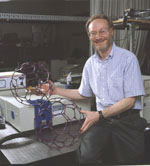
|
|
|
What you
would do: Projects involve photophysical studies of
fullerenes and their derivatives. Typical activities include
sample purification followed by the measurement of triplet decay kinetics and transient
spectra. The goals are to investigate triplet state properties and deactivation
channels such as energy transfer and self-quenching. The apparatus is functional and
easy to use, allowing undergraduates to obtain real results even when their lab time is
limited.
What you would learn: This is a
good chance to take a small project to completion and be a co-author on
publications. Students also have opportunities to present the work at local meetings
Environment:Undergrads work with
graduate students, but are closely supervised by the professor.
Suggested Experience: Should
have completed or be taking the Physical Chemstry sequence. |
|
|
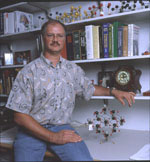 |
|
|
|
Description: The Whitmire
research group is involved in a number of inorganic and organometallic
research projects. These projects involve synthesis of new cluster
compounds, metal alkoxides and other metal complexes which are targeted
for their relevance to catalysis, materials science and pharmaceuticals.
We are exploring the catalysis of industrially important transformations
of organic molecules as catalyzed by transition metal clusters and have
a new apparatus that allows us to probe these reactions directly under
reaction conditions. We are also interested in preparing new metal
alkoxides and are developing routes to making heterometallic species
which may be used as precursors to existing or new solid state materials
or oxidation catalysts. We are also beginning to develop a program
in pharmaceutical bismuth compounds since bismuth has a documented
biological activity but is the least toxic of the heavy metals.
These synthetic studies are under girded by molecular orbital
calculations and we collaborate with the research group of Professor
Jean-Yves Saillard in Rennes, France, in order to carry out that work.
Besides the normal synthetic and analytical techniques taught in the
laboratory classes at Rice, members of the group learn hands on about
single crystal x-ray diffraction and multinuclear, variable temperature
nuclear magnetic resonance which are very valuable for understanding the
structures in both solid and solution phases as well as probing
molecular dynamics.
Your Job in the Lab:
Undergraduates who join the research group are given independent
research projects and are encouraged to develop their own ideas and
strategies in consultation with Professor Whitmire and the other
researchers in the group. Research plans are developed after
consideration of the undergraduate student's goals and interests in
research and what types of techniques he/she wishes to learn.
Recommended experience:
Generally having a solid background in freshman chemistry is adequate.
Much of the lab work is specialized, such as the use of vacuum lines,
Schlenk lines and dry boxes, and is taught during the course of
the project.
Positions Open: I have at
least one and probably two paid positions available for the summer 2000
and could easily accommodate 4 students during the fall semester. |
|
|
 |
|
|
Organization: The graduate students are very helpful, and the professor comes by once a
day, but is generally less accessible.
Environment: This is a fun
group, with some of the more cheerful grad students in the university. They sing along
with songs on the radio, have a sense of humor, and usually seem to enjoy what they're
doing. Typically, you'll spend 10-12 hrs/wk in lab, doing a lot of repetitive
chromatography.
What you would learn:New
challenges are always presenting themselves.
Suggested Experience:Definitely
Chem 351/352. Previous lab experience is helpful, since you're on your own more in this
lab than in others. There aren't people around to show you basic techniques, like how to
set up a distillation apparatus. |
|
|
|
|